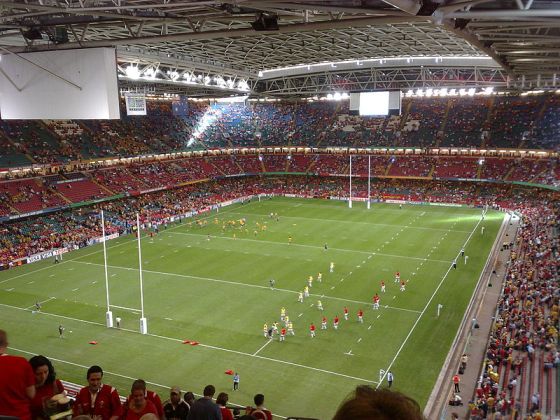Wales - The Millenium Stadium

View from the North Stand (Upper) with the roof closed
Since
1999, Wales have had a world-class stadium in the Millenium Stadium
that befits the importance and stature of rugby union in the country.
The Welsh national team have been competing in fixtures since 1881, and
rugby is undoubtedly the national sport here. In the Six Nations and
its previous incarnations, the Welsh have won the title 25 times (with
11 Grand Slams) and shared the trophy on a further 11 occasions. Their
most recent success came in in the 2013 tournament, when despite an
opening day defeat to Ireland the boys in red lifted the trophy with a
thumping of England on the final day.
Ground Information Back to Top ^
Located right in the heart of the Welsh capital Cardiff on the banks of the River Taff, the Millenium Stadium is a superb multi-purpose sporting arena. In addition to rugby union maches, the Millenium also hosts soccer, concerts, rugby league and motorsports events.

There are three tiers of seating on three sides, with a
slightly unusual gap in the structure in the North Stand where there
was limited space and therefore only two tiers. There are no standing
terraces within the ground. The North and South stands are behind the
posts, with the East and West stands running along the sidelines.
Despite the size of the ground, the proximity of the stands to the
pitch mean that even the cheaper seats in the top tier aren't too far
from the action, and the giant screens suspended from the roof at
either end of the ground help fill in any gaps.
As you would expect with a modern international stadium, the facilities
are top-notch and supporters are sure to have a great day out,
especially with the sights and sounds of Cardiff on the doorstep. Welsh
supporters are passionate about their national team, and with a full
house and the roof closed there are few better atmospheres in world
rugby than at the Millenium Stadium.
Getting There Back to Top ^
As the stadium is right in the middle of Cardiff City, it is not difficult to find - simply follow the signs from the M4 motorway. However, there is no parking available at the stadium so you will need to find parking in the city centre or avail of the Park and Ride facilities on offer.
By Train
Cardiff is served by two rail stations, both of which are within a short walk of the stadium. Cardiff Central is the major station with services to destinations including Newport (15 minutes), Bridgend (20 mins), Cardiff Airport (30 mins), Bristol (35 mins), Swansea (55 mins), Swindon (60 mins), Gloucester (60 mins), Bath (65 mins), Llanelli (70 mins), Reading (90 mins), Birmingham (120 mins), London Paddington (130 mins) and Manchester (210 mins).
Cardiff's second station Queen Street only serves destinations within Wales, including those to the Vale of Glamorgan and the South Wales Valleys.
By Air
Cardiff (Rhoose)
International Airport is located around 13 miles South-East of the
City. Scheduled flights operate to destinations including Dublin,
Newcastle, Belfast, Edinburgh, Glasgow, Paris and Amsterdam.
The X91 bus takes 35 minutes between the airport and City Centre, with
services every two hours. Alternatively, a shuttle bus operates from
the terminal to the airport train station, where an hourly service
(two-hourly on Sundays) takes you to Cardiff Central station in about
thirty minutes.
Edinburgh Airport
Edinburgh Airport is about 6 miles from Murrayfield and 8 miles from the City Centre. Although a relatively small airport, it does offer scheduled flights to most destinations in the UK and Ireland and a few further afield, including Belfast (City and International), Birmingham, Bristol, Cardiff, Cork, Dublin, East Midlands, Exeter, Jersey, Knock, London (City, Gatwick, Heathrow and Luton), Manchester, Milan (Malpensa), Norwich, Paris (CDG), Rome (Ciampino), Southampton and Shannon. Budget airlines Easyjet and Ryanair are the main players here. The Airlink 100 bus departs every 10 minutes or so during the day, and passes Murrayfield on its way into town - a quick and easy alternative for those who want to avoid the expense of taxis.
Glasgow Airport
Glasgow Airport is an alternative option but a little trickier to negotiate once you arrive - first take a bus from the airport to Glasgow city centre then an onward bus or train to Edinburgh. A wide range of airlines operate into the airport, including Easyjet (to Belfast, Bristol, London and Paris amongst others), Flybe (to Belfast, Birmingham, Cardiff, Exeter, Manchester, East Midlands, Paris, Southampton), Aer Lingus (to Cork and Dublin) and British Airways (to London)
Drinking Back to Top ^
It's relatively easy to get a pint within the ground - there are 27 bars spread across all three tiers of the stadium and quick-pour machines ensure that services are swift. The bars are open before and during matches, with some remaining open for up to ninety minutes after the final whistle for post-match analysis.
Before/After the Game
You are spoiled for choice with options for drinks before and after a game in Cardiff, with the majority of bars, pubs and clubs within walking distance in a city famous for it's hospitality and nightlife. If you want to sample something local, try a pint of Brains, brewed in the local area.
Help Add Material to this Section
Eating Back to Top ^
Sleeping Back to Top ^
As a capital city and a popular tourist destination in its own right, Cardiff has a good range of accommodation on offer for visitors. You can stay pretty much anywhere in the City Centre and be within walking distance of the stadium, pubs, clubs, restaurants and attractions.There are branches of the Best Western, Radisson, Marriott, Park Inn, Hilton, Ibis, Novotel, Thistle, Mercure, Premier Inn and Travelodge chains in town, amongst other independent hotels and guest houses.
Make a Trip of It Back to Top ^
In Town- Take a guided tour of the Millenium Stadium and see behind
the scenes, including access to the dressing rooms, tunnel, VIP suites
and press facilities. Tours last approximately 1 hour and begin at the
Cardiff Arms cafe (between Gates 3&4).
- Cardiff Castle is a short walk to the North of the
Millenium Stadium and Arms Park, and dates back over 2000 years.
- Wales' most popular heritage attraction is just outside the
City Centre - St Fagan's National History Museum. This open-air museum
features buildings and galleries from throughout Welsh history, and is
free to enter. Take the 32A, 320 or 322 buses from Cardiff Central Bus
station - the journey takes about 20 minutes.
- The redeveloped Cardiff Bay area is a fine place to spend an afternoon, with great scenery, bars and restaurants.
- The Brecon Beacons National Park is a short drive or bus journey from Cardiff, and offers some of the finest scenery and outdoor activities in the UK.
Key Information
- Capacity
74,500 - Address
Westgate Street
Cardiff
CF10 1NS - Website
www.wru.co.uk
Disabled Supporters
- Accessibility has been designed into the Millenium Stadium, with access via level plazas and shallow ramps. There are 156 spaces for Wheelchair users, and a number of disabled car parking spaces are available if reserved in advance - contact [email protected].
Ground Facts
- The Millenium Stadium was opened in 1999, in time to host
the opening ceremony and final of the 1999 Rugby World Cup.
- The Millenium is the only rugby union stadium in the UK to
have a retractable roof.
- The North Stand backs onto Cardiff Arms Park, home of the
Cardiff Blues regional side and Cardiff RFC.
Mixed World Cup Record
- Wales have competed in all 7 tournaments of the World Cup
so far, making the semi-finals in the inaugural tournament in 1987
before being defeated by eventual champions New Zealand. In 1991 and
1995 the side disappointed by failing to qualify from the pool stages
at the expense of Samoa and Ireland respectively.
- In 1999, Wales hosted the competition and topped their
group before being defeated 24-9 by Australia in the quarter-finals.
Australia hosted the 2003 competition, and Wales fell at the
quarter-final stage again to England, whilst in 2007 they failed to get
out of their group once again.
- 2011 saw a marked change in fortune for the
Welsh, where despite a narrow pool stage defeat to South
Africa the side defeated Ireland in the quarter-final, before an
agonising single-point defeat to France robbed them of a place in the
final that most neutrals felt they deserved.
Add Your Information
- Got something to add? Spotted a mistake? The Rugby Ground
Guide is dependent on your input to make it work
- You can submit information or images here.
